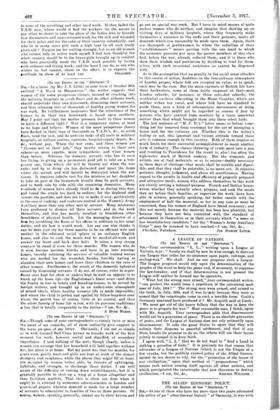[To THE Emma or me " Seecreron."3 Sue,—In a letter
(by Mr. J. S. Little) in your issue of October 20th entitled "A Word to Housewives" the writer suggests that women of the more prosperous classes, instead of crushing into the military hospitals to scrub floors and do other arduous work, should undertake their own housework, dismissing their servants, and thus releasing tens of thousands of healthy young women for war work. He furthermore insinuates that the reluctance of the former to do their out housework is based upon snobbery. May I point out that the matter presents itself to these women in quite a different light ? War is a temporary status, at least so we hope and believe. Women of the more prosperous classes lave flocked in their tens of thousands as V.A.D.'s, he., to scrub foors, tend the sick, and do arduous tasks of all sorts in military hospitals, at welfare centres, canteens, hospital-supply depots, he., he., without pay. When the war ends, and these women are "thrown out of their job," they merely return to their own sphere—as more capable, more sympathetic, and wiser women than before. Whereas the domestic servant, who has to earn her living, is giving up a permanent paid job to take on a tem- porary one, from which she will be thrown out when the war ends; and by so doing she has dislocated and upset the home where she served, and will herself be dislocated when the war teases. It requires infinite tact for the mistress or her daughter to take on part of the housework usually done by paid servants, and to frolic side by side with the remaining domestics. Many hundreds of women have already tried to do no during this war, and found the strain too hard to endure; for the depleted staff resents the position, and does not try to make it easy, particularly in the case of cooking; and cooks are wanted in the Women's Army Auxiliary more than any other sort of servant. Many mistresses have preferred to dismiss all their servants and do the work themselves, and this has mostly resulted in breakdown after breakdown of physical health. Let the managing director of a firm try scrubbing the floors of his offices in addition to his usual duties, and see how it would work. Let any one who thinks it can be done just try for three montlm to be on efficient wife and mother in the educated social sphere in an ordinary English louse, and also to cook the meals and be maid-of-all-work and answer the front and back door bells. It takes a very strong creature to stand it even for three months. The women who do it soon become nerrous wrecks and have to go into nursing- homes, thereby retaining the services of valuable trained nurses who are needed for the wounded, besides forcibly having to abandon their own homes and leave their children to the care of ether women. Furthermore, the result of the domestic upheaval caused by dismissing servants (I do not, of course, refer to super- fluous ones kept for show or unders kept to wait on uppers) is to break up the home life—the Englishman's finest onset—and drive the family to live in hotels and boarding-houses, to be served by foreign waiters, and brought up in an undesirable atmosphere et mixed ideals, where healthy nursery life is made impossible; and where the child is petted and spoiled by fellow-boarders over whom the parent has, of course, little or no control, and them the whole beauty of home life is lost, with its precious traditions; a loss that is totally irreparable to the nation.—I am, Sir, be., A HOME MAKER.














































 Previous page
Previous page